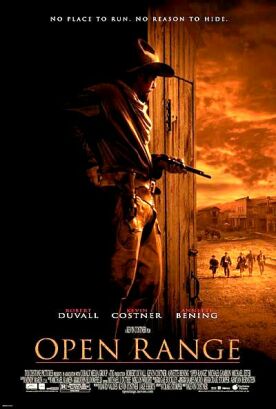 |
|
|
|||||||||||||||||||
Well which is it? "Frontier justice" or "Middle Eastern violence"? Or could it possibly be both? Back in the heyday of the movie Western, few people thought of "Frontier justice" as anything but justice pure and simple, and Kevin Costnerís self-consciously retro Open Range, which he directs from a screenplay by Craig Storper, seems to be hoping that there are still enough people like that to make it a hit. Not that he doesnít make concessions to the more up-to-date sensibilities of those, like Mr. Powers, for whom the principle of "an eye for an eye, a life for a life" smacks of wild primitivism, not to say barbarism. Costner himself plays Charlie Waite, a Civil War veteran who is trying to put his violent past behind him but who is once again transformed into a lean, mean killing machine when a pal is murdered by the hired thugs of an Irish rancher called Denton Baxter (Michael Gambon). In a classic confrontation, Baxter is trying to close down the open range and with it the way of life of the already old-fashioned cowboy. Waiteís fatherly comrade at the last round-up, "Boss" Spearman (Robert Duvall), has to teach him not only that their day is past, and that living in a house, in a town, with a wife ainít so bad, but also the difference between justice and vengeance. But though Charlie presumably learns the lesson, it may be less clear to the popcorn munchers of America whose enjoyment or otherwise of Charlie and Bossís hecatomb of more or less nameless and faceless bad guys is unlikely to be much affected by the one or two lives that they rather oddly spare in the name of justice. As far as I can make out, justice is still what it was in the old Westerns, only now youíre just supposed to feel really bad about meting it out. The trouble is that the movie is a little too retro, as if Costner is working to a formula ó a bit of Shane here, a bit of High Noon there ó designed to produce the hit that his career so badly needs. The only thing that comes across as truly genuine and from the heart is his love-affair with the romance of Kevin Costner ó the big strong man with the Secret Sorrow whose sensitivity and vulnerability is only revealed to us about once every five minutes. "I done things I ain't proud of," he tells Sue Barlow (Annette Benning), the middle-aged sister of the town doctor and his love interest. Yeah, yeah. Less shooting your mouth off and more shooting the bad guys, bub. But Sue ó what do you know? ó spots this once and future manslayer as being actually "gentle and caring" ó even though, as he continually insists, "I been trying to put some bad times behind me." "It makes sense to me to let things breathe a little, not bury Ďem," says Sue, obviously a clinician in her own right. "I been learning that," he replies. And, boy, has he! This old maidís wooing of both Kevin Costner and his exquisite conscience goes on at interminable length and produces a completely bogus ending as for no good reason Charlie rides off not once but twice, away from the woman he loves and back to the open range, in order to spend some more time with that Secret Sorrow, that he loves a good deal better than he does her, if you ask me. Meanwhile what about the guy with the two sons who have to learn that "thereís things eat on a man worse than dyiní"? We arenít told what these things are, but we can guess that they include leaving "frontier justice" unsatisfied. Yet these two strapping lads hardly even have speaking parts, let alone show what transforms them ó as we are meant to presume they are transformed ó from gentle souls not looking for any trouble to brave men willing to fight and die for what they believe. Unlike Message in a Bottle, with which it has Kevinís Secret Sorrow in common, Open Range is not a terrible movie, and Duvallís performance (as so often) as the one fully realized character of Boss is especially to be commended. But itís way too long and self-indulgent, and the archetypal situation of frontier justice, where a manís got to fight or to run, to chose life or honor, to stand up for himself and for justice or to knuckle under to superior strength, gets lost amidst Mr Costnerís all too typical Byronic posturings. [Top][Back] |
|||||||||
|
|||||||||||||||||||
|
|


